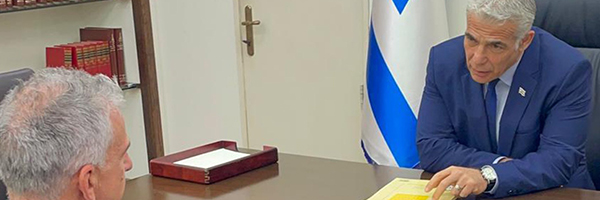 The Cradle, August 27, 2022 — Israel alleges that the Biden administration is preparing a military option against Iran in parallel to the efforts to revive the nuclear deal
The Cradle, August 27, 2022 — Israel alleges that the Biden administration is preparing a military option against Iran in parallel to the efforts to revive the nuclear deal
Statements given to western media by the head of the Mossad, David Barnea, brought to light divisions brewing between Israeli decisionmakers towards the Iran nuclear deal.
Israeli reporter Barak Ravid has revealed that interim Prime Minister Yair Lapid was surprised by recent Barnea’s condemnation of Washington’s position, after the spy chief called the nuclear agreement “a strategic disaster.”
Hours before Barnea’s comments, Lapid appeared in front of the cameras to say that the White House accepted a large part of the “Israeli positions” regarding the Iran nuclear deal, adding that: “The dialogue with them is good, and we will continue it.”
As such, the Mossad chief’s position was not in line with the message that the premier’s office wanted to convey, and also disregarded the progress made in Washington by National Security Adviser Eyal Hulta.
Barnea argues that the entire security establishment supports his position against the nuclear agreement.
However, within the security establishment there are several officials who actually express support of the nuclear deal, notably Aharon Halifa, who heads the army’s Operations Directorate, which is responsible for overseeing the Israeli army’s preparedness for war.
Additionally, the deal is supported by Amit Saar, head of Intelligence Research, and Dror Shalom, head of the political-Military division in the ministry of defense.
In a bid to dismiss the concerns in Israel, Defense Minister Benny Gantz traveled to the US and visited on 26 August the headquarters of the US Army’s Southern Command. He also met with White House National Security Adviser Jake Sullivan.
During his stay, Gantz was reportedly shown evidence that Washington has been preparing a military option against Iran in parallel to the talks to revive the nuclear deal, an Israeli defense official informed Ravid.
“We influenced and still influence the emerging deal but for now it is still far from serving our interests. Our messages were heard and I think they are being taken into consideration. I went out feeling much more satisfied,” the defense official added.
For his part, previous Israeli prime minister Ehud Olmert in an interview with 103FM radio scolded the officials for their uncoordinated media statements and placed blame on former prime minister Benjamin Netanyahu for weakening Israel’s options against Iran.
In 2007, Olmert oversaw the destruction of Syria’s nuclear program and led the most successful intelligence operations against Syria and Hezbollah in the last decade.
